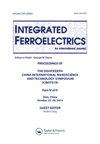tb3 +掺杂硼酸锂钠钾玻璃的亮绿色发射及其光子应用
IF 0.7
4区 工程技术
Q4 ENGINEERING, ELECTRICAL & ELECTRONIC
引用次数: 0
摘要
摘要采用熔体淬火法制备掺铽硼酸锂钠钾玻璃(LNKBTb)。利用阿基米德原理、吸收光谱和发光光谱,包括CIE色度来表征玻璃的性质。玻璃中的铽吸收可见光和近红外范围内的光子。在紫外-可见(UV-Vis)光激发下,铽5D4向7F5跃迁,在544 nm处产生了强烈的绿色辐射。当Tb2O3含量达到4mol %时,LNKBTb玻璃的发射强度随浓度的增加而增加,之后发射强度下降,导致浓度猝灭效应,而衰减时间随Tb2O3含量的增加而缩短。在CIE 1931中,发射的整体颜色为绿色。可带来可继续发展用作绿色光源和激光器中的光子材料。作者要感谢玻璃技术和材料科学卓越中心研究实验室的所有研究生和合作研究人员,还有Rajamangala理工大学工业材料科学系。披露声明作者未报告潜在的利益冲突。本项目由泰国国家研究委员会(NRCT)资助(合同编号:N41A650404)和CERNTEK COMPANY LIMITED。本文章由计算机程序翻译,如有差异,请以英文原文为准。
Bright Green Emission of Tb 3+ Doped Lithium Sodium Potassium Borate Glasses for Photonic Application
AbstractThe melt-quenching approach was implemented to create terbium-doped lithium sodium potassium borate glasses (LNKBTb). Archimedes’ principle, absorption and luminescence spectra, including CIE chromaticity were used to characterize the properties of glasses. Terbium in glasses absorbs photon in the visible and near infrared ranges. The intense green emission at 544 nm was generated by the terbium 5D4 to 7F5 transition when excited with ultraviolet–visible (UV–Vis) light. The emission intensities of LNKBTb glasses increased with increasing terbium concentrations up to 4 mol%, after which they decreased, resulting in the concentration quenching effect, whereas decay time decreases as Tb2O3 content increases. In CIE 1931, the overall color of emission is green. May bring can continue to develop to use as a photonic material in green light sources and lasers.Keywords: Borate glassesCIEluminescenceterbium AcknowledgmentsThe authors would like to thank all graduate students and co-researchers in the research laboratory of the Center of Excellence in Glass Technology and Materials Science, and there is also the Industrial Materials Science Division Faculty of Science and Technology Rajamangala University of Technology Phra Nakhon.Disclosure StatementNo potential conflict of interest was reported by the author(s).Additional informationFundingThis project is funded by the National Research Council of Thailand (NRCT) (Contract No. N41A650404) and CERNTEK COMPANY LIMITED.
求助全文
通过发布文献求助,成功后即可免费获取论文全文。
去求助
来源期刊

Integrated Ferroelectrics
工程技术-工程:电子与电气
CiteScore
1.40
自引率
0.00%
发文量
179
审稿时长
3 months
期刊介绍:
Integrated Ferroelectrics provides an international, interdisciplinary forum for electronic engineers and physicists as well as process and systems engineers, ceramicists, and chemists who are involved in research, design, development, manufacturing and utilization of integrated ferroelectric devices. Such devices unite ferroelectric films and semiconductor integrated circuit chips. The result is a new family of electronic devices, which combine the unique nonvolatile memory, pyroelectric, piezoelectric, photorefractive, radiation-hard, acoustic and/or dielectric properties of ferroelectric materials with the dynamic memory, logic and/or amplification properties and miniaturization and low-cost advantages of semiconductor i.c. technology.
 求助内容:
求助内容: 应助结果提醒方式:
应助结果提醒方式:


